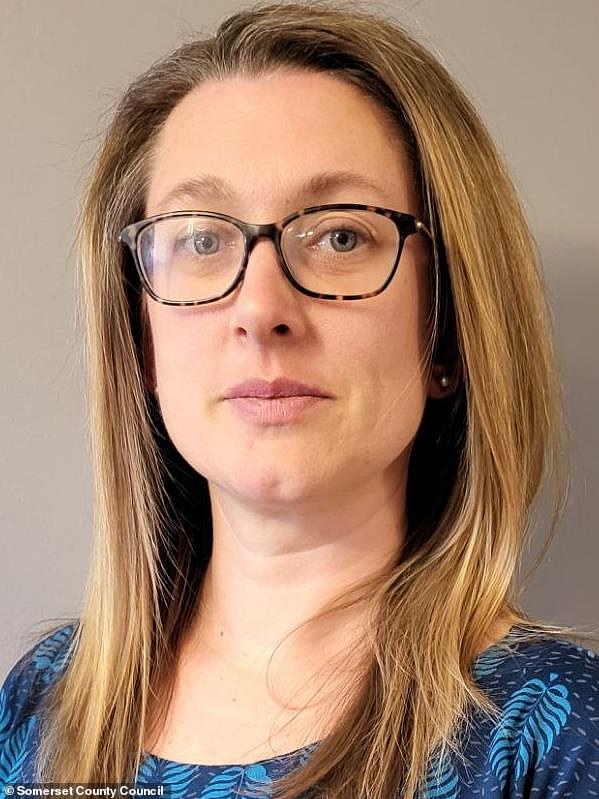A coroner has warned menopause is not being treated with enough ‘importance’ by NHS after hearing how a school teacher killed herself following its onset.
Jacqueline Potter, 54, drove her car into the path of a HGV on overnight leave from a mental health unit.
Mrs Potter, who was known as Anne, had experienced a decline in her mental health after starting the menopause, an inquest into her death heard.
She left her home on the morning of December 5, 2020, and drove along the A303 in Somerset before purposefully swerving into the path of the HGV.
Following the conclusion of the inquest last month, senior Somerset coroner Samantha Marsh has now written a prevention of future deaths report after being told Somerset NHS Foundation Trust does not have an ‘expert’ in menopause and it would be difficult to have one as menopause ‘isn’t a disease or an illness’.
She also highlighted the disparity between the care given in the public sector compared to the private, and said that a number of women ‘are not fortunate enough’ to be able to access private clinics.
The coroner said this means they may not be able to ‘access the services and expertise they need at a very crucial transitional phase in their lives’.
The coroner said: ‘Menopause is not a lifestyle choice, it is an unavoidable part of a woman’s natural biological cycle.
‘Without wishing to introduce sweeping generalisations, menopause is likely to affect 50 per cent of the population at some point in their lives.’
The coroner said she was ‘surprised’ to learn during the inquest that ‘menopausal training is not mandatory in any area of clinical practice or specialism’.
Ms Marsh said she was ‘concerned’ that there is no requirement to undertake essential compulsory menopausal training for those working in ‘relevant’ clinical practices such as Mental Health Practice, Obstetrics and Gynaecology and Oncology, or even general as a general GP.
The inquest was told Somerset NHS Foundation Trust had just one ‘menopause specialist’ – a GP who covers the entire Trust area.
The coroner said: ‘Not all GP surgeries have a menopause specialist practitioner (or access to one) despite a GP usually being the first port of call for women in the community when seeking primary care.
‘Those GP Surgeries who do have a practitioner who acts as a ‘specialist’ is often a GP with a personal interest who has taken the initiative to go on courses and broaden their learning and understanding, rather than any mandatory requirement for a Surgery [or group with multiple surgeries] to have an available community ‘front-line’ specialist.

Language teacher Jacqueline Potter, 54, drove her car into the path of a HGV on overnight leave from a mental health unit
‘Whilst I do not dispute that is it not a disease, menopause is a condition; it does have symptoms and it does have recognised presentations, yet there appears to be a failure to recognise this condition as having equal importance to other ailments or diagnoses,’ she added.
The coroner said the fact that women experiencing depression during the menopause are directed to look at resources on the NHS website shows ‘the lack of importance given to menopausal symptoms’.
Ms Marsh said: ‘If someone has concerns about heart disease, a worrying lump, a broken bone etc they expect to be able to consult a medically qualified professional who has a knowledge and understanding of their condition or presentation and can diagnose and treat accordingly; not just [and I paraphrase] ‘have a look at a website to help’.’
The jury inquest into Mrs Potter’s death heard the teacher, from the village of Kingsbury Episcopi in Somerset, first visited her GP to discuss her anxiety in 2008.
For the following 13 years, Mrs Potter – who worked as a language teacher at Bishop Fox’s Community School – had various consultations to discuss her mental health symptoms.

Samantha Marsh, Senior Coroner for Somerset (pictured) said there was a ‘failure to recognise’ menopause as ‘having equal importance to other ailments or diagnoses’
In January 2021, Mrs Potter reported feeling ‘fragile, anxious and stressed’.
She spoke with her GP and the coroner said this was the first time menopause or perimenopause was ‘mentioned’.
She was started on hormone replacement therapy (HRT) – a treatment that uses hormones, primarily estrogen and progesterone – and prescribed antidepressant medication.
By the Spring, her symptoms appeared to be ‘under control’.
But in September 2022, her mental health declined again and so she was restarted on the medication.
That month, the teacher took an overdose of paracetamol and she was taken to Yeovil District Hospital in Somerset to receive treatment.
The following month, Mrs Potter agreed to a voluntary admission to an acute psychiatric unit.

Mrs Potter drove along the A303 (pictured) at Podimore, Somerset, and deliberately drove into the path of the HGV tank lorry on the opposite carriageway
The inquest heard this was after she had been returned home by the police after a member of the public reported seeing her ‘wandering in traffic’.
She was detained under the Mental Health Act.
The inquest heard Mrs Potter had a ‘devoted and supportive’ husband and family, who were involved in her care and recovery.
On December 3 2022, the teacher was granted leave to visit a Christmas market with her husband.
It was heard this went ‘without incident’ and Mrs Potter appeared ‘brighter’ and was making plans with her family for the forthcoming Christmas period.
The inquest said the mother was ‘finding pleasure and enjoyment’ in things again, and the mental health team gave evidence to her enjoyment at watching Strictly Come Dancing.
They said this highlighted a departure from her previous anhedonia, which is the inability to feel pleasure.
The following day, Mrs Potter was allowed to go on overnight leave and her husband collected her at 10am that morning.
It was heard he locked the doors and windows, and hid those keys in a desk drawer.
The coroner said he did not hide the car keys, as ‘he did not think for one minute that his wife would take the car’.
Ms Marsh said that on the morning of December 5, Mrs Potter found the back door key in the desk drawer and took the car.
The inquest heard she was seen ‘driving erratically’ by multiple other road users who were travelling eastbound on the A303 that morning.
At around 07.48am she drove her car into the path of a fully laden HGV tanker travelling on the westbound carriageway. There was nothing the tanker driver could have done to avoid the collision and she died instantly of multiple traumatic injuries.
In a tribute Mrs Potter’s family described her as ‘fiercely loyal and sweet’.
They said: ‘She was a loving wife, mother, grandmother, sister and daughter and was loved and cherished by us all.
‘A kind, sweet and fiercely loyal person, we can’t put into words how much we will miss her.
‘She always gave the best advice and had a brilliant sense of humour.’
The family said she was a ‘well respected teacher’ with ‘an amazing talent for languages’, and added: ‘The loss to our family and friends is immeasurable and she will always be with us in our hearts.’
The coroner sent her report to a number of medical organisations including NHS England, and they must respond to the report by 19 June 2025.
After the inquest, the Trust said it was working to develop a clearer single document that includes risks and a safety plan, that will be shared with families when a patient has leave from our mental health units.
It said it was also developing plans to ‘improve our colleagues’ knowledge on the wider implications of the menopause, as well as improving the process of allocating a named nurse to individual patients’.












